The Long, Looong, Loooooong Road To a TCO
OR: One more reason why I tend to drink a lot, am chronically depressed, and have almost no hair left. And also why I also hate bureaucrats and Fridays. (See The Battle for Electricity for a similar tale of woe.)
NOTE: And the story isn't over yet!
What's a TCO?
A TCO is a Temporary Certificate of Occupancy. It's basically conditional permission to occupy a structure, which is granted in advance of a full, final Certificate of Occupancy. The difference between a TCO and a CO depends on the municipality, and it's usually decided on a case-by-case basis, where the inspector has the discretion to assert you've met sufficient criteria to make a structure safely habitable, even though it's not completely finished yet. In most cases, there's very little distinction between a TCO and a CO; in my case, it's somewhat rubbery because my Township is a bit more liberal than most—thankfully.
The Curse of the Homeowner/Builder
Blessing from the County Health Department is key to either a TCO or CO: they need to perform their own final inspections, plus they need to receive certain critical documents; then they issue a Certificate of Compliance to the homeowner asserting these criteria have been met to their satisfaction, and a copy is sent to the Township, so they can do their own inspection and issue the actual TCO/CO.
However, the Health Department does not have a checklist to hand out to homeowners applying for a Certificate of Compliance, because developers are usually the ones responsible for this, and they already "know the ropes." Even the Township isn't necessarily aware of the full array of documents required by the HD. As a very rare individual homeowner/builder (and even more rare for reaching the point of legal occupancy), I was at a severe disadvantage, as I found out the long, hard way: one only learns of all the requirements after considerable trial and error—like a year of it. I do not exaggerate.
A number of contractors with whom I've spoken (including the septic engineers responsible for mopping up the approval mess) have confirmed that most government and many business entities actively hate us homeowner/builders, principally because we create extra work for them; in some cases, they'll "punish" us by deliberately making things as difficult as they can. And I will attest to the fact that this is all quite true.
The Checklist
These were the items required by the County Health Department according to the Township per their reply to me when I first applied for a TCO on 11 February 2019 (my mother's birthday, so how could I forget):
- final septic system inspection
- final well inspection
- water test report
Obviously, since my well wasn't even hooked up to the house yet, I had quite a few things to get done first. So I started saving my pennies, and by May 2019 I was able to get the well hooked up. Then came the water test: FAIL. So I had to save up even more pennies for a $1,000 water filtration system (below); by July 2019 I'd finally obtained a clean bill of water health. And with that, I immediately called the County Health Department to request they do their final well and septic inspections.
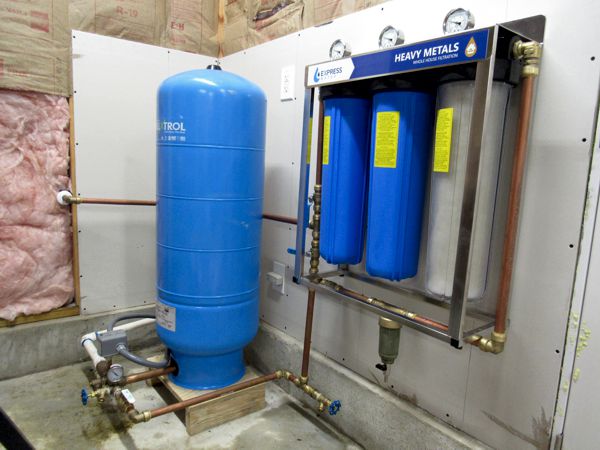
Now, this is where things really started to go sideways...
I called three times over the course of four weeks requesting final well and septic inspections. The first time I called, they said they'd be there the next day; the second time, they said two to three business days; the third time, they wouldn't commit to a timeframe. No one ever showed up. Ever.
On my fourth call, I complained calmly yet very strenuously, and I finally reached someone who took the time to check my records, whereupon I learned that I'd already received my final Health Department inspections! The final well inspection was performed a month earlier—twice (due to a failure of internal communication, to put it politely), and the final septic inspection had been performed... wait for it... October 2015!
After I recovered from that shock, my next question was, "What else do you need?" The water test results (which the testing company was supposed to have already sent in directly), the well report (which the well driller had also supposedly sent in directly), and—here's the shocker—the septic engineer's final report. Excuse me, you've been waiting for that last report for four years? Yup.
Naturally my next call was to the septic engineers. "Where's my engineer's final report?" "We'll have to search for it." Two weeks later, they emailed a copy to me—at least, it's what they thought I needed—and the very next day I mailed hardcopies of everything the Health Department (supposedly) required.
"You're Screwed"
One week went by. Two weeks went by. Three weeks went by. Four weeks went by. No letter. Called the Health Department. "Where's my letter of approval?" "Oh, we didn't receive anything from you." "Anything?" "Anything." Neither the items I mailed in, nor the ones submitted directly by others, including the water test from the lab (which they'd actually sent twice), and the well report from the well driller.
Although quite enraged, somehow I wasn't surprised. So I asked them for an email address where I could forward all of the documents—and before the question finished passing my lips, I somehow knew there'd be a problem. "Oh, no, we require a hardcopy of the septic engineer's report with the engineer's raised seal." It would have been nice to know that in advance! Just to make matters worse, they said the septic engineer was also supposed to have provided me with the County Health Department Certificate of Compliance Application.
Called the septic engineers. They had no final report with a raised seal, nor were they aware of the Health Department Certificate of Compliance Application. Worse, the engineer in question was no longer with the company. I relayed this information to the Health Department; their reply was a tactfully polite version of, "Well, you're screwed." I asked for their advice on how to address the problem... and they had none. So, call it "hopelessly screwed."
Once I regained my composure, I again focused on the septic engineers. "I have a really big problem," I told them, "and right now you're the only ones who can fix it." After swapping emails with them for a week, I learned that the original engineer didn't complete the final report because I had no electricity at that time of his inspection, and the septic system has a pump. Did anyone ever bother to tell me this? Of course not! Their solution? Re-inspect the whole septic system.
It sounds on the surface as though it was all the fault of the septic engineers, but there was more than enough blame to go around. Consider: not only did the County Health Department fail to clarify exactly what they needed from me, but they lost all of the documents that had been sent to them. Adding insult to injury, the woman on the phone—with whom I've spoken many times—had the gall to claim she'd never spoken to me before, which was her excuse for not explaining anything to me. Oh great, lies on top of incompetence! Any wonder why I tend to drink a lot, am chronically depressed, and have almost no hair left? And also hate Fridays? (More on that in a bit...)
The Real Checklist
And so, as I came to learn by very slow and very painful means, the actual Health Department sign-off requirements included:
- preliminary HD septic system inspection
- final HD septic system inspection*
- septic engineer's report with engineer's seal
- preliminary HD well inspection
- final HD well inspection
- well report from the State
- water test report from an approved lab
- application for Certificate of Compliance
As of early October, the checked items were the only ones the Health Department could verify as having. I had backup copies of everything they lost, so it was all down to the septic engineer's report. And that meant waiting. And waiting. And waiting. Meanwhile, I simply had to look at the bright side of all this, or else I'd lose my mind: the longer I waited for the TCO, the more stuff I'd get done on the house, and the more likely the Township would grant it. But who was I kidding?
*As I came to learn much later, this wasn't really their "final." But now I'm getting ahead of myself...
Whiskey Tango Foxtrot
The septic engineering firm re-inspected my system on 10 October 2019. It was a relatively painless process, although it was incredibly thorough—they measured, examined and photographed every element of the system, right down to the interior of the pump control box. I also had to email a number of photographs and drawings to them.
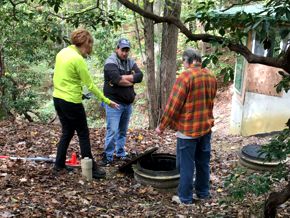
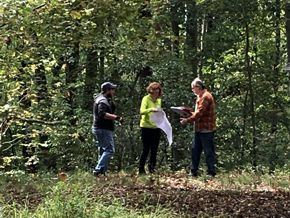
Two weeks later, the septic engineer contacted the County Health Department to get the permit number for my application, and the County worker complained to the engineer about all of the paperwork I failed to submit to them. Whiskey Tango Foxtrot! Fortunately I'd emailed the engineer a day earlier explaining how the Health Department had lost everything that's ever been sent to them, including things from myself as well as businesses, so the engineer had a much better perspective of the situation going forward; indeed, she was willing to go to bat for me and help resolve the problem. At least I had someone on my side for once.
Then came the bombshell on 1 November: the Health Department wanted three new permeability tests done on the fill material used in the disposal field. The material was originally tested during construction, yet for reasons known only to the County, they wanted these new tests on a system for which they'd already given their final approval over four years ago! All of which of course was going to cost me even more time and money, not to mention emotional health. And naturally, as has happened countless times before, I received the bad news on a Friday, so that I'd get to stew over it helplessly all weekend.
Then, just to pile it on, I learned on 8 November 2019 (guess what—a Friday!) that the State DEP rejected my well driller's well record, and approval was pending the well driller's corrections because—horrors!—he'd used an outdated form. Well, let's see: it took from 5 May to 8 November for them to review—and reject—the document. How long would it take for them to approve the corrected version? And then the approved version had to be forwarded to the County Health Department for their approval. I just might be dead before this was all done.
If there was any good news at this point, it was that the County finally, finally, finally gave their Official Blessing on my well water—all thanks to the septic engineer, who ensured that the Health Department received, and acknowledged receipt of, the water test report dated 2 July 2019 (of which they'd previously lost no less than three copies). One down, two to go: well and septic system. Well approval was contingent on them receiving an official, approved copy of the well report (to replace the one they lost), which would have to be procured from the State DEP, and who knew how long that would take...
Squeezing My Berries
Two more Fridays came and went with zero progress. After three more exchanges of written correspondence with the County, I learned that they hadn't really signed off on the system, because they had a fine-print caveat: "pending the engineer's approval." Well, since said engineer left the firm before finishing the job, the sign-off from 2015 didn't count, which meant they would enforce their new, current rules requiring a total of four tests—and just to add insult to injury, they actually didn't require any tests back in 2015, as I later learned. I was starting to feel it where it counts.
Knowing I'm super-tight on funds, the septic engineers did their level best to fight the County over the new testing, but the County would not budge. And on 3 December 2019 I received the worst news in this whole sorry saga to date: the four tests, plus the re-inspection, plus all of the necessary paperwork, would cost between two and three thousand. That meant the TCO would definitely be pushed off until 2020, since there was no way I could come up with that much scratch by the end of the year—indeed, I was going to finish 2019 in the red as it was.
Given that it was the original septic engineer's departure in the middle of the process that precipitated this whole mess, they owed me something, and by 12 December they'd agreed to accept a payment plan so that I could spread the cost out over the first several months of 2020. The work was set to begin on 23 December—which left me wondering how realistic their plan was, given its proximity to the holiday.
New Year, New Problems
As expected, nothing happened in December, and the engineers rescheduled for the second week in 2020, assuming good weather. For once, things went as planned, even though it was only about 30° when they came out to collect the samples on 9 January.

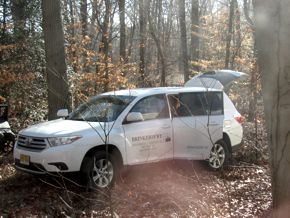
Then came another long wait for stuff to happen, since collecting the samples was step one of five. Step two was to run the tests; step three, compile the report and submit it to the County Health Department; step four, wait for the Health Department's approval; and step five, get the Township out for their TCO inspection.
But by 21 January 2020, things hadn't even made it past step one: I was informed that one of two critical tests had failed (not surprising, really, since the system had been in use for eight months). Still, the engineers were confident they could collect a different sample and get the test to pass. Fortunately they also made the very wise choice not to charge me for the re-test. Basically it just meant another two weeks had been added to the already never-ending process.
23 January then became the day things started to deteriorate quickly, with possibly dire consequences. The septic engineer showed up to
gather more samples, and proceeded to spend the next five hours digging holes all over the disposal field trying to find something usable. The
problem: it would appear the fill material was contaminated with clay for reasons unknown. The solution: if the second set of samples did not yield acceptable test
results, the system might have to be torn out and rebuilt, despite the fact that it worked perfectly.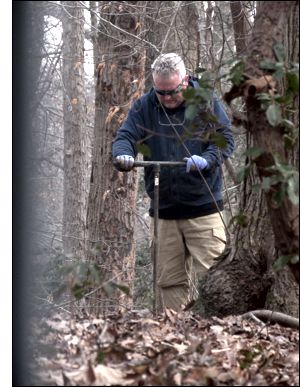
Subsequently, even more bad news emerged: the septic engineer revealed to me that he was told the fill material used in my system had no certification papers, when all such materials should have official documents detailing their composition and expected performance. Worse, he said that the contractor who built the system had stopped returning his calls. Things appeared to be spiraling out of control.
31 January (another Friday, FWIW) brought some curious news: the engineer told the builder that a portion of the disposal bed had to be dug up for further testing, all on the builder's dime. Suddenly the builder said he had the fill material certification papers at hand—when before he didn't. Hmmm... The engineer informed me that he should have the paperwork by the middle of the following week. Did he? Take a guess... And in just a few more days, I'd be entering Year Two of the TCO application process.
11 February (anniversary of the TCO application) brought a reversal: the builder had gone radio silent. Phone, text, email, all ignored. Now the engineer was starting to feel my pain. But the following day brought frustration: I'd completely forgotten that I had the septic system builder's personal cell phone number, so when I found it, I took matters into my own hands and called him. We spoke very briefly—I certainly didn't need to explain why I was calling—and he assured me the matter would be resolved "right away," whatever that meant. But it turns out it was just lip service to shut me up: when I contacted the engineer later, he said there'd been no progress on his end. I asked the engineer if I should start looking for a lawyer; he answered, "Not just yet."
On Friday, 14 February 2020, I was assured by the engineer that I would be receiving the fill material certification early the following week. I was also assured that the certification would obviate the need for any further testing (leaving me wondering if I'd be billed for tests that were never used). This gave rise to a spike in my skepticism: I had to see it to believe it...
Just When the Finish Line Was In Sight...
On 20 February the entire process was suddenly put on hold as I went into the hospital for congestive heart failure. While I was getting poked and prodded and X-Rayed, the septic builder actually delivered his paperwork; it was the last piece of the puzzle. But getting my TCO at that point was waaay down on my priorities list, so everything sat until I was out of the hospital.
By April I was well enough to get back into it, and contacted the septic engineers. They assured me they'd received the paperwork, and they'd be submitting it all to the County Health Department shortly. But then the whole Coronavirus mess hit the fan, and everything—and I mean everything—ground to a complete halt. There was no knowing when things might return to normal (or even some new, semi-functional normal) and we could pick up where we left off...
Note that I still don't have a TCO, and I've no idea when I will. In fact, I may die before that happens!
No Final CO
Assuming I get my TCO, I do not plan to file for a final CO in my lifetime. Why on Earth would I do that, you ask? Because once I pass the final, I'm required to pay a hefty COAH fee, which is basically a penalty passed down from the municipality to the homeowner for their inability and/or unwillingness to meet the State's affordable housing quota. My fee will be nearly $2K—an enormous hit to my already-decimated budget. Fortunately I'm allowed to extend a TCO almost indefinitely, or hopefully at least until I'm dead. After that, it'll be up to the new owner, whoever that may be.
